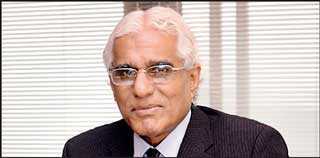Wednesday Feb 18, 2026
Wednesday Feb 18, 2026
Friday, 29 November 2019 00:30 - - {{hitsCtrl.values.hits}}
Reuters: The Central Bank is likely to leave its key interest rates on hold at a policy review today, a Reuters poll indicated, while it waits for the new Government’s economic policies after the election of a fresh President on 16 November.
 |
Dr. Indrajit Coomaraswamy |
New President Gotabaya Rajapaksa promised to boost annual growth to 6.5% in his election manifesto. He swore in his elder brother, former President Mahinda Rajapaksa, as Prime Minister and Finance Minister, cementing the family’s political comeback.
Local investor sentiment has been positive on the election of Rajapaksa, a former wartime Defence Chief who has pledged to secure the country against militant threats following the Easter Sunday bombings this year.
All 12 economists surveyed by Reuters expected the Central Bank of Sri Lanka to keep both its standing deposit facility rate (SDFR) and standing lending facility rate (SLFR) steady at 7.00% and 8.00% respectively.
All predicted the statutory reserve ratio (SRR) would also be kept at 5.00%.
The Central Bank has loosened policy in several steps to boost sluggish growth after tourism and investments plummeted following the Easter Sunday bomb attacks by Islamist militants.
“The external sector is supporting a rate cut, but this time the Central Bank will keep the rates steady due to a liquidity shortage,” said Dimantha Mathew, head of research at broker First Capital Holdings. “However, the probability of a rate cut in the next meeting is higher.”
The Central Bank has cut its benchmark rates by 100 bps in two meetings since May and reduced the SRR by 250 bps, releasing around Rs. 150 billion ($ 832 million) of liquidity to the financial market. It also imposed caps on rupee deposit interest rates that enabled banks to reduce the cost of mobilising funds from the general public.
As a result, the commercial banks’ average weighted prime lending rate (AWPR) fell 62 basis points between the last rate cut in August and 22 November.
The rate cuts have already put pressure on the rupee currency, which has fallen 0.6% amid foreign outflows from Government securities.
The attacks on luxury hotels and churches on 21 April killed more than 250 people, and private sector credit growth remains sluggish.
The island nation’s economic growth eased to a 17-year low of 3.2% in 2018 and the IMF expects the pace to slow to 2.7% this year. A Reuters poll has predicted 2019 growth will be the lowest in nearly two decades.
State finances, meanwhile, remain under pressure with a heavy external debt repayment schedule between 2019 and 2022.
Central Bank chief Indrajith Coomaraswamy said on Monday he was resigning and would step down on 20 December because of personal reasons and an age limit.
Central Bank sources said Senior Deputy Governor Nandalal Weerasinghe was an option if the President opted for a career central banker.